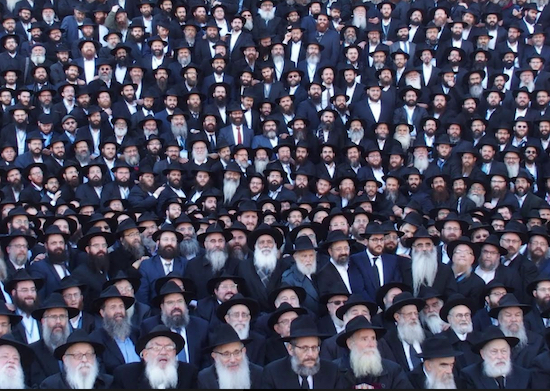Ivrit—the spoken Hebrew of contemporary Israel—shares with every other ancient language the challenge of expanding its vocabulary to accommodate the modern world. Computers, telephony, advances in the identification, and the diagnosis and treatment of disease all demand constant innovation of terminology. So too do the disciplines of politics, economics, sociology and psychology.
There are no ancient Hebrew words that correspond to the English terms “sympathy” and “empathy”. “Sympathy” is generally rendered ahadah, and empathy as empatiyah, two terms with which the authors of the mishnayot and baraitot of Avot would have been entirely unfamiliar. However, both sympathy and empathy are what we would rightly regard today as basic human emotions. Family and social life would be intolerable without them, and much of the entertainment industry depends on its popularity for its ability generate these feelings in a paying audience
Where do we find either of these concepts in Avot? R’
Yisrael Miller (The Wisdom of Avos) discusses the pair of them at Avot
6:6, which lists all 48 of the qualities that are said to contribute to one’s
ability to acquire knowledge and understanding of Torah. One of these qualities
is this:
נוֹשֵׂא בְעוֹל
עִם חֲבֵרוֹ
Bearing the yoke together with
one’s friend.
Commenting on this Baraita, R; Miller writes:
“This is the quality of empathy,
a word so commonly misused that we have to clarify its true meaning. ‘Sympathy’
means to feel for the other person, while ‘empathy’ means to feel what the
other person is feeling. … ‘Sharing the yoke’ means to try as best we can to
develop empathy by imagining ourselves in the other person’s place, even when
we have never been there.”
He adds that this applies as much to happy occasions as to
sad ones, then goes on to ask the obvious question: what does the possession of
empathy have to do with acquiring Torah? His answer is an affirmation of an
observation made by R’ Simcha Zissel Ziv: developing an understanding of Torah
involves learning to comprehend what we do not yet comprehend—not only
additional facts but new perspectives, which require us to step outside
ourselves to see the subject from a different point of view. The need to step outside one’s own experience
and mindset is actually presupposed by Hillel at Avot 2:5 when he teaches
(among other things):
אַל תָּדִין
אֶת חֲבֵרָךְ עַד שֶׁתַּגִּֽיעַ לִמְקוֹמוֹ
Do not judge your fellow until
you have stood in his place.
Whether the quality demanded here is empathy, sympathy or
both is unclear—but is plain is that some form of stepping outside one’s own
mind and into someone else’s is expected before making a pronouncement on
another person’s feelings, intentions and consequent actions. The tie-in
between sympathy/empathy and judging of a fellow human is also apparent at Avot
6:6, where the item that immediately follows sharing the yoke in the list of 48
qualities of a ben Torah is to be מַכְרִיעוֹ לְכַף זְכוּת (“Judging [him] favourably”). This juxtaposition
allows one to infer that the ability to judge others fairly and favourably is
somehow a consequence of being able to enter their mindset.
Empathy and sympathy feature elsewhere in Avot too. Thus we
see the teaching of Rabbi Shimon ben Elazar at Avot 4:23:
אַל תְּרַצֶּה
אֶת חֲבֵרֶֽךָ בְּשַֽׁעַת כַּעֲסוֹ, וְאַל תְּנַחֲמֵֽהוּ בְּשָׁעָה שֶׁמֵּתוֹ
מֻטָּל לְפָנָיו, וְאַל תִּשְׁאַל לוֹ בְּשַֽׁעַת נִדְרוֹ, וְאַל תִּשְׁתַּדֵּל
לִרְאוֹתוֹ בְּשַֽׁעַת קַלְקָלָתוֹ
Do not pacify your friend at the
height of his anger; do not comfort him while his dead still lies before him;
do not ask him about his vow the moment he makes it; and do not try to see him
at the time of his degradation.
I can sympathise with a person for being angry when I see an
objective basis for him to be angered—but it is well-nigh impossible to feel
the extent of another’s anger, especially when it is fuelled by other causes
that were hitherto bottled up. Not comforting the person who is in the process
of burying his dead is an injunction to avoid sympathy that is simply
mistimed—and gloating over a person’s shame when he is embarrassed or
humiliated by something that was his own fault is something one should try to avoid.
We may have no sympathy at all for his stupidity and firmly believe that it
serves him right and that he got what he deserved. But if you can empathise
with his present predicament you will leave him to lick his own wounds, just as
you would almost certainly prefer if you were in the same position.
So, conclude, the Tannaim clearly appreciated the qualities
of sympathy and empathy, even though they may have had no convenient verbal
label for them.
For comments and discussion of this post on Facebook,
click here.
For a fascinating set of notes on the origins of ahadah and empatiya, lovingly prepared by ChatGPT, click here.


